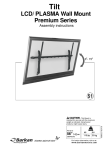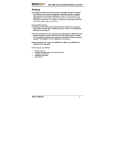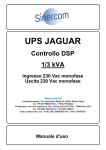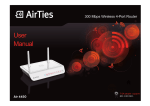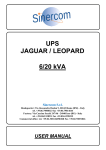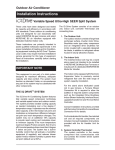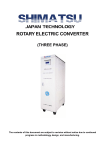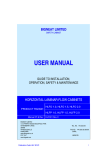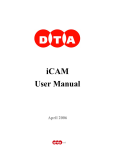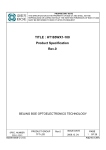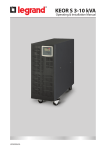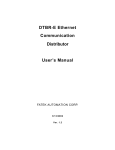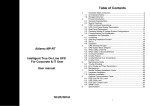Download PANTHER SERIES - Sinercom S.r.l.
Transcript
PANTHER SERIES HIGH FREQUENCY ONLINE UPS 1kVA – 10kVA 1 Phase In - 1 Phase Out Sinercom srl Headquarter: Via G. Cappalonga 9/A‐ 00043 Ciampino (Rm) (Italy) tel. +39.06.79800323 fax +39.06.79814644 Factory: Via Cascina Secchi 247/4b ‐ 24040 Isso (BG) tel. +39.0363.938231 fax +39.0363.998235 USER MANUAL Thank you for purchasing product. Observe the warnings on the machine and manual strictly and properly keep the manual. Do not operate the UPS before read safety notes and operation instructions. 2 TABLE CONTENTS 1、 Introduction.......................................................................................................................2 1.1 Description of Commonly Used Symbols...........................................................................2 1.2 Safety Instructions...............................................................................................................2 2、 Product Description...........................................................................................................4 2.1 System Type and Configuration..........................................................................................4 2.2The Appearance of the UPS.................................................................................................5 2.3 Operating Principle .............................................................................................................8 3、 Installation.......................................................................................................................10 3.1 Unpacking Inspection .......................................................................................................10 3.2 Installation Notes ..............................................................................................................10 3.3 Cable Connection..............................................................................................................11 3.3.1Connecting Input and Output Cables ......................................................................11 3.3.2 Operation Procedure of External Battery for Long Backup Time UPS .................14 3.3.3 Connecting Communication Cable ........................................................................15 4、 Operation.........................................................................................................................20 4.1 Introduction of Display Panel ...........................................................................................20 4.2 Operation Mode ................................................................................................................22 4.2.1 Normal mode..........................................................................................................22 4.2.2 Bypass mode ..........................................................................................................24 4.2.3 Battery mode ..........................................................................................................25 4.3 Operating Instructions....................................................................................................25 4.3.1 Turning On and Completely Powering Down the UPS .........................................25 4.3.2 Conducting Battery self-diagnosis .........................................................................27 4.3.3 Error code and Warning code.................................................................................28 5. Maintenance................................................................................................................................29 5.1 Battery Maintenance .........................................................................................................29 5.2 Checking UPS function..................................................................................................30 6、Troubleshooting ........................................................................................................................31 5、 Specifications ..................................................................................................................33 7.1Electrical ............................................................................................................................33 7.2 Environmental...................................................................................................................34 7.3 EMC..................................................................................................................................34 7.4 Safety ................................................................................................................................34 7.5 Industry Standard ..............................................................................................................34 6、 Warranty .........................................................................................................................35 1 1、 Introduction 1.1 Description of Commonly Used Symbols Some or all of the following symbols may be used in this manual and may appear in your application process. Therefore, all users should read the form carefully and thoroughly. Symbol & Description Symbol Description Caution, danger Danger electric shock Alternating current (AC) Direct current (DC) Protective ground Recycle Do not dispose with ordinary trash 1.2 Safety Instructions 1. Read this manual carefully and thoroughly before operation the UPS and save this manual properly for future reference. 2. Do not tear up or shatter the alarm table on the UPS and pay attention to it. 3. Please do not overload the UPS beyond its designed capacity. 4. The UPS contains large capacity batteries. The case of the UPS must not be opened by untrained personnel; otherwise it may cause electric shock. 5. Do not let battery or batteries get close to any heating source and do not incinerate battery or batteries, they may explode. 2 6. Do not open or mutilate the battery or batteries, released electrolyte is highly poisonous and harmful to the skin and eyes. 7. Do not short the positive and negative of battery electrode. Otherwise, it may cause electric shock or fire. 8. Do not plunge or insert any objects into the air vents and other inlets. 9. Do not store or use the device in the following environment: ! Where there is inflammable gas, corrosive agents or heavy dust ! Where the temperature is very high or low (above 4"0 or below 0") ) or the humidity is very high(more than 90%) ! Under direct sunlight or close to heating facilities ! Place of strong vibrations ! Outdoor 10. In the event of fire occurring in the vicinity, please use dry powder fire extinguishers . The use of liquid fire extinguishing agents may cause electric shock. 3 2、 Product Description The On-Line-Series is an uninterruptible power supply incorporating double-converter technology. It provides perfect protection specifically for strict load. The double-converter principle eliminates all mains power disturbances. A rectifier converts the alternating current from the socket outlet to direct current. This direct current charges the batteries and powers the inverter. On the basis of this DC voltage, the inverter generates a sine wave AC power, which permanently supplies the loads. Designed with the proven on-line, double conversion architecture, this series of UPS offers the greatest degree of availability in power protection and provides continuous, high-quality AC power to connect strict load, especially for the basic equipments in some areas as: finance, communication, government, traffic, manufacture, education and so on. 2.1 System Type and Configuration There are two types of UPS according to the battery configuration: standard type and long backup time type, each available in the following ratings: 1kVA --1 0kVA UPS. Table 2-1 UPS types and configurations Type Standard Model 1kVA PANTHER 1KR With a 1A internal charger and 3 batteries 2kVA PANTHER 2KR With a 1A internal charger and 6 batteries 3kVA PANTHER 3KR With a 1A internal charger and 8 batteries 6kVA PANTHER 6KR With a 2A internal charger and 16 external batteries 10kVA PANTHER 10KR With a 2A internal charger and 16 external batteries 1kVA 2kVA Long Backup Time Remark 3kVA 6kVA 10kVA PANTHER 1KR-XL PANTHER 2KR-XL PANTHER 3KR-XL PANTHER 6KR-XL PANTHER 10KR-XL With a 7A internal charger and external batteries With a 8A internal charger and external batteries With a 8A internal charger and external batteries With a 4A internal charger and 16 external batteries With a 4A internal charger and 16 external batteries Note: “XL” model show Long Backup Time. 4 2.2The Appearance of the UPS (1) Front view Figure 2-1 PANTHER 2U Figure 2-2 PANTHER 3U (2) Rear view Figure 2-3 The rear panel of PANTHER 1KR(XL) 5 Figure 2-4 The rear panel of PANTHER 2KR Figure 2-4 The rear panel of PANTHER 2KR-XL Figure 2-6 The rear panel of PANTHER 3KR Figure 2-5 The rear panel of PANTHER 3KR-XL 6 Figure 2-7 The rear panel of PANTHER 6KR Figure 2-8 The rear panel of HP9115CRT 10K 7 Figure 2-9 The front external view 2.3 Operating Principle 1-3kVA Figure 2-10 The UPS operating principle 8 6-10kVA Figure 2-11 The UPS operating principle 1. Input filter: Perform a filter for input .It provides clean AC power to the UPS. 2. AC/DC converter: In Normal mode, it converts the AC input power to regulated DC power. 3. DC/DC converter: Raises the DC Voltage from the battery system to the optimum operating voltage for the inverter when the UPS operates in Battery mode. 4. DC/AC inverter: In Normal mode, it utilizes the DC output of the AC/DC converter and inverts it into precise, regulated sine wave AC power. In Battery mode, it receives energy from the battery through the DC/DC converter. 5. Bypass: It is very important in the UPS system. In the event of an UPS fault that will not lead to UPS shutdown, the load will be automatically transferred to the bypass. Meanwhile, the LED indicators will indicate the fault type, and the fault information will be reported through the communication ports. 6. Charger: Standard model: 1A charging current for PANTHER 1KR ~3KR; charging curre nt 2A for PANTHER 6KR~10KR; Long backup model: 7A charging current for PANTHER 1KR-XL ; 8A charging current for PANTHER 2KR-XL ~ 3KR-XL; 8A charging current for PANTHER 6KR-XL ~ 10KR-XL 7. Battery: Sealed maintenance-free lead #acid battery can be used as the DC source of the UPS. 8. Output filter: Perform a filter for output .It provides clean AC power to the load. 9 3、 Installation 3.1 Unpacking Inspection 1. Open the packing box of UPS and take it out, visually examine the unit for transit damage. 2. Check against the accessory lists that the accessories of the UPS are present. (Refer to Table 3-1). 3. If the UPS arrives damaged, or there is any missing accessory, please contact the distributor immediately. Table 3-1 Accessory list of UPS Model Accessory Quantity Unit Input power cord 1 Pcs Standard Model RS232communication line 1 Pcs 1KR~3KR User manual 1 Pcs A Winpower software CD 1 Pcs Input power cord 1 Pcs Long backup RS232 communication line 1 Pcs Time User manual 1 Pcs 1KR-XL~3KR-XL A Winpower software CD 1 Pcs External Battery Cable 1 Pcs Input power cord 1 Pcs standard/ long RS232 communication line 1 Pcs backup Model User manual 1 Pcs 6KR(XL)~ 10KR(XL) A Winpower software CD 1 Pcs External Battery Cable 1 Pcs 3.2 Installation Notes 1. When locating the UPS, make sure there is no hazardous objects around the UPS, and that the installation environment meets the specifications. 2. The UPS should not be titled. The air inlet port at the front panel and the outlet port on the rear panel and two side panels should not be blocked so as to ensure good ventilation. 3. In case if the UPS is unpacked, installed and used at very low temperatures, condensations of water drops may appear. It is necessary to wait until the UPS fully dried inside out before proceeding to installation and use. Otherwise, they may be a risk of electric shock. 4. Place the UPS near the utility power source outlet which supplies power to the UPS. In any emergency, switch off the main input socket, cut off the battery voltage input. All power sockets must be connected with ground protection. 10 3.3 Cable Connection. 3.3.1Connecting Input and Output Cables 1. Input cable connection If the UPS is connected via the power cable, please use a proper socket with protection against electric current, and pay attention to the capacity of the socket: over 10A for PANTHER 1KR( XL)~2KR(X,L)over 16A for PANTHER PANTHER 3KR(XL) over 32A for PANTHER 6KR( XL) and over 50A for PANTHER 10KR(XL), The wiring configuration is shown in the following diagram. Mains input Figure 3-1 Connection Method of Input for PANTHER 1KR(XL)~3KR(XL) 2. Output cable connection Table 3-2 Output way of UPS Rating Model Quantity of output socket Output Terminal Block 1kVA PANTHER 1KR(XL) 2 Nil 2kVA PANTHER 2KR(XL) 3 Nil 3kVA PANTHER 3KR(XL) 2 Available 6kVA PANTHER 6KR(XL) Nil Available Nil Available 10kVA PANTHER 10KR(XL) The output of PANTHER 1KR(XL)/PANTHER 2K(RXL)/PANTHER 3KR(XL) all available to uses sockets. The total output power shall not 1kVA/0.8kW, 2kVA/1.6 kW,3kVA/2.4 kW!6kVA/4.8 kW! 10kVA/ 8 k W. Simply plug the load power cable to the output sockets of UPS to complete connection as shown in the following diagram. 11 Figure 3-2 Connection method of output for PANTHER 1KR(XL)~3KR(XL) Apart from using the socket for output, PANTHER 3KR(XL) has the terminal block available for output as well when the output current over 10A recommended. The wring configuration is shown in the following diagram. 1) Remove the cover of the terminal block; 2) Use AWG14 (2.1mm²) wires for wiring configuration; 3) Upon completion of the wiring configuration, please check whether the wires are securely affixed; 4) Put back the terminal block cover to the rear panel. Figure 3-3 Connection method of terminal block for PANTHER 3KR(XL) 12 The input and output of PANTHER 6KR(XL)/PANTHER 10KR(XL) all available to use terminal block, The wiring configuration is shown in the following diagram. 1) Remove the cover of the terminal block; 2) PANTHER 6KR(XL)use AWG10 (5.3mm²) wires for wiring configuration; PANTHER 10KR(XL)use AWG10 (8.4mm²) 3) Upon completion of the wiring configuration, please check whether the wires are securely affixed; 4) Put back the terminal block cover to the rear panel. Figure 3-4 Connection method of terminal block for PANTHER 6KR/10KR(XL) Caution: Do not connect the loads with terminal block by the personal without qualified training. 13 3.3.2 Operation Procedure of External Battery for Long Backup Time UPS The battery connection procedure is very important. Any incompliance may result in the risk of electric shock. Therefore, the following steps must be strictly complied with. 1. First connect in series the batteries of the pack to ensure proper battery voltage that PANTHER 1KR-XL for 36VDC,PANTHER 2KR-XLf or 72VDC , PANTHER 3KR-XL for 96VDC; PANTHER 6KR-XL/10KR-XL for 192VDC. 2. Take out the battery cable delivered with the UPS(only for 1-3kVA) , one end of the external battery cable is a plug for connecting the UPS, the other end has 3 open wires for connecting the battery pack. (6-10kVA Refer to Figure3-4) 3. Connect the external battery cable to the battery terminal (DO NOT connect the battery socket of the UPS first. Otherwise, it may cause electric shock). Connect the red wire to the +! terminal of the battery. The black wire is connected to the -! terminal of the battery. The green/yellow wire is grounded for protection purpose. 4. Connect the plug of the external battery cable to the external battery socket on the rear panel of the UPS to complete the connection procedure. (for 1-3kVA) Figure 3-5 Battery connection diagram for Long Backup Models 1-3kVA Note: The length of the external battery cable is normal, If users need a longer one, please consult the distributor. There is a limit to the length of the external battery cable to ensure normal operation of the UPS. 14 3.3.3 Connecting Communication Cable 1. Computer interface computer interface: The type of signals, serial command (RS232), is provided by the UPS to communicate with a host computer. User can use WinPower software to monitor the UPS through the port. 2. Alternative connection of communication Intelligent Slot: It is designed for installing the AS400 card, SNMP card and CMC card. You can choose for one of them to installed a-AS400: You can utilize AS400’s monitor function to manage the power supply directly. b-SNMP: It enables you monitor the UPS remotely through Internet. c -CMC: Central monitor card. Note: 1. Remove the cover board of the intelligent slot before any card is installed. 2. Refer to some other relative documents for the use of the WinPower software and the 15 AS400 and SNMP and CMC cards. If you have any question about the above communication ports, please contact customer service center. 3. Surge-protection connection--only for PANTHER 1KR(XL)~3KR(XL) a—Output: Connects the equipment to be protected. b—Input: Connects the telephone line or network. 4. Parallel operation--only for PANTHER 6KR(XL)-10KR(XL) Brief introduction of the redundancy N+X is currently the most reliable power supply structure. N represents the minimum UPS number that the total load needs; X represents the redundant UPS number, i.e. the fault UPS number that the system can handle simultaneously. The bigger the X is, the higher reliability of the power system is. For occasions where reliability is highly depended on, N+X is the optimal mode. As long as the UPS is equipped with parallel cables, up to 3 UPSs can be connected in parallel to realize output power sharing and power redundancy. Parallel installation 1) User need to opt a standard 25-pin communication cable, which should have 25 cores, 16 corresponding stitches and shield, as the UPS parallel cable. The length of the parallel cable is appropriate to be less than 3m. 2)Strictly follow the stand-alone wiring requirements to perform the input wiring of each UPS 3)Connect the output wires of each UPS to an output breaker panel 4)Each UPS need a independent battery pack 5)Please refer to the wiring diagram in the next page, and opt suitable breaker. The requirement of the output wiring is as follows: When the distance between the UPSs in parallel and the breaker panel is less than 20 meters, the difference between the wires of input & output of the UPSs is required to be less than 20%. When the distance between the UPSs in parallel and the breaker panel is greater than 20 meters, the difference between the wires of input & output of the UPSs is required to be less than 10%. 17 18 Operation and maintenance 1)To perform the general operation, follow the stand-alone operating requirement. 2)Startup: The units transfer to INV mode simultaneously as the y start up sequentially in Line mode. 3) Shutdown: the units shut down sequentially in INV mode. When the last one completes the shutdown action, e ach unit will shut down the inverter simultaneously an d transfer to Bypass mode. It is easy to operate the equipment, with no previous training. You just need to re ad through this manual and operate according to the instructions in it. Parallel Installation Diagram 19 4、 Operation 4.1 Introduction of Display Panel 1. ON/OFF button: The ON/OFF button provides the following functions: 1) Turn on UPS system: By pressing the ON/OFF button more than 1 second, the UPS system is turned on. 2) Turn off UPS system: By pressing this button more than 1 second turns off the UPS system whenever the UPS run under the normal mode/battery mode. 2. Enter button (only for 6-10kVA) verify the selection 3. Select button Select button main function is: 1)If UPS in bypass mode or no output model, the button can be used to enter setup mode to choose UPS output voltage and frequency and set buzzer is available. 2) Confirm button If UPS in bypass mode or no output model, the key can be used to enter setup mode to choose UPS output voltage and frequency and set buzzer is available. (only for 1-3kVA) Note: The alarm silencing function of the Function button is valid only in battery mode, and invalid for any other UPS alarm. 20 Display LED indicator Information or data When the fault occurs, this light bright City light Inverter lamp When the machine in the inverter status, this light bright Trouble light When the fault occurs, this light bright Input information Display input voltage Display voltage range 0-999 VAC Display input voltage Display voltage range 0.00-99.9 VAC Output information Display UPS output voltage Display voltage range 0-999 VAC Display UPS output frequency Display frequency range 0.0-99.9Hz 21 Load information Display load power WATT or VA value of the ratio Battery status information Display the battery voltage capacity of the ratio Fault/warning Display buzzer, warning, mains, batteries, charging state identification Output voltage, frequency and bypass choose information Choose UPS output voltage, choose 200VAC anyone 208VAC,220VAC,230VAC under No output mode or bypass mode. Choose UPS output frequency, choose anyone frequency 50Hz or 60Hz under No output mode or bypass mode. Choose buzzer switch, choose buzzer opening and closing under No output mode or bypass mode. 4.2 Operation Mode 4.2.1 Normal mode In the normal mode, the display on the front panel is shown in the following diagram. The utility power indicator and the inverter indicator are turn on. The load/battery capacity indicator will be turned on in accordance with the load capacity connected. 22 1. Mains mode LCD are shown in the following figure: 2. If output overloaded, the load level indicators will be turned on and alarm will beep twice every second. You should get rid of some unnecessary loads one by one to decrease the loads connected to the UPS less than 100% capacity of the UPS. 3. If the battery indicator blinks, it indicates that no battery is connected to the UPS or battery voltage is too low. You should check if battery is properly connected to the UPS. If the connection between battery and UPS is confirmed without any problem, it may be due to the defect or aging of the battery, please refer to the troubleshooting! in chapter 6 to solve the problem accordingly. Note:Connection to the power generator should be made according to the following steps: Activate the power generator and wait until the operation is stable before connecting the output of the power generator to the UPS (be sure that the UPS is in idle mode). Then, turn on the UPS according to the startup procedure. After the UPS is turned on, the loads are connected one by one. It recommended that the capacity of the AC generator chosen should double that of the UPS. 23 4.2.2 Bypass mode 1. When the ups is running in battery mode, the alarm will beep every 4 seconds. If the/ “Function” button is pressed for more than 2 seconds the alarm will not beep(silence function).Press the Function! button more than 2 seconds again to resume the alarm function. Battery mode LCD are show in the following figure: 2. When the battery capacity decreases, the number of load/battery capacity indicators turned on will decrease. If the battery voltage drops to the pre-alarm level (capable of maintaining the backup time for more than 2 minutes), the alarm will beep every second to remind the user of insufficient battery capacity. Then, the load operations should be carried out promptly and the load will be eliminated one by one. 3. It is possible to check the backup function via the UPS even though utility power is not connected. 24 4.2.3 Battery mode When operating in bypass mode set up through WinPower software, the display on the front panel is show in the following diagram. The utility power indicator and the bypass indicator are turn on. The load/battery capacity indicator will be turned on in accordance with the load capacity connected. The UPS beeps every 2 seconds. 1. If the utility power indicator blinks, it shows that the voltage or frequency of the utility power is out of the input range of the UPS or there are problems with reversed polarity (L/N) of site wiring or disconnect to the ground for protection. 2. Other display on the front panel is same as those mentioned in normal mode. 3. When operating in bypass mode, the backup function of the UPS is not available and the power used by the load is directly from the utility power via internal EMI filter. 4.3 Operating Instructions 4.3.1 Turning On and Completely Powering Down the UPS Note: The battery is fully charged before delivery. However, storage and transportation will inevitably cause some charge loss. Therefore, it is advisable to charge the battery for 10 hours before using it, so as to ensure adequate battery autonomy. 25 1. Turning on the UPS The operation of turning on the UPS contains: turning on with utility power and turning on without utility power. 1) Turning on with utility power: Connect the mains input to the UPS, press and hold the ON/OFF button for 1 second until the buzzer beeps. At this point, the UPS begins to conduct self-diagnosis, with the load/battery capacity indicators on the front panel turned on and then off one after another. Seconds later, the UPS will begin to operate in Normal mode; meanwhile, the utility power indicator, inverter indicators will turn on. If the utility power is abnormal, the UPS will work in battery mode. 2) Turning on without utility power: With no mains input feed to the UPS, hold and press the ON/OFF button for 1 second until the buzzer beeps. In the power on process, the UPS has the same operation as if it is connected to utility power except that the utility power indicator is not turned on and the battery indicator is turned instead. 2. Powering down the UPS The operation of powering down the UPS is shown as follow: 1) Completely power down the UPS from Normal mode Hold and press the ON/OFF button persistently for more than 1 second to power off the UPS. If it is set up to work in bypass mode by WinPower software and the bypass indicator will be turn on to indicate that the UPS is working in bypass mode. In order to cut off the output from the UPS, simply cut off the utility power supply. Finally, not any display is shown on the front panel and no output is available from the UPS outlets. 26 2) Completely power down the UPS from Battery mode Press the ON/OFF! button persistently for more than 1 second to power off the UPS. When being powered off, the UPS will start self-diagnosis and all the load/battery capacity indicators will be turn on and off one after another. Finally, not any display is shown on the front panel and no voltage output is available from the UPS outlets. 4.3.2 Conducting Battery self-diagnosis In UPS operation, users can manually initiate battery self-diagnosis to check the battery conditions. There are two methods to initiate the battery self-diagnosis: 1. Through the function button In normal mode, press and hold the function for more than 2 seconds until the buzzer beeps. indicating the UPS has worked in battery mode and the battery self-diagnosis has started. The battery self-diagnosis will last for 10 seconds default (Users can set up it through WinPower software). In the event of a battery fault during battery selfdiagnosis, the UPS will transfer to normal mode automatically. 2. Through the background monitoring software Users can also initiate battery self-diagnosis through the background monitoring software. 27 4.3.3 Error code and Warning code --for PANTHER 1KR(XL)~3KR(XL) Error code Description Warming code Description 1 Communication error 11 EPO state 2 Short circuit 12 Battery overvoltage 3 Over load 13 Fan alarm 4 Thermal 14 Charging error 5 UPS voltage 15 Overload 6 Inverter fault 7 NTC open 8 Other fault Error code and warming code --for PANTHER 6KR(XL)~10KR(XL) Error code Description Warming code Description 1 Communication error 11 Line SCR fault 2 Short circuit 12 Line in fuse fault 3 Over load 13 BAT Abnormal 4 Over temperature 14 Other fault 5 BUS fault 21 Fan alarm 6 Inverter fault 27 Charging error 7 FPC fault 28 Eeprom fault 10 Inverter RLY fault 28 5. Maintenance 5.1 Battery Maintenance The battery is key component of the UPS. The battery life depends on the ambient temperature, charge and discharge times. High ambient temperature and deep discharge will shorten the battery life. 1. Sealed maintenance-free lead –acid battery be used in the standard. When being connected to the utility power whether the UPS has been turned on or not, the UPS keeps charging the battery and also offers the protective function of charging and discharging. 2. Keep the ambient temperature between 15℃ and 25℃ 3. If the UPS has not been used for a long period, charging is recommended at the intervals 3 months. 4. Normally, the battery should be charged and discharged every 4 to 6 months. Charging should be begin after the UPS shout down automatically in the course of discharging. In the regions of hot climates, the battery should be charged and discharged every 2 months. Moreover, the standard charging time should be not less than 10 hours. 5. Batteries should not be replaced individually. All batteries should be replaced at the same time following the instruction of the battery supplier. 6. Under normal conditions, the battery life lasts 2 to 3 years. In case if the battery is found not in good condition, earlier replacement should be made. The battery should only be replaced by qualified service personnel. Note: 1. Prior to battery replacement, the UPS must be turned off and disconnected from utility power. 2. Metal objects such as rings and watches should be removed. 3. Use the screwdriver with insulated handle. Tools and other metal objects should not be placed on the battery 4. Short circuit or reverse connection between the positive and negative terminal of the battery is strictly forbidden. 29 5.2 Checking UPS function Every time when conducting field maintenance, please check the regular function of the UPS, including: 1. Check the operation status of the UPS If the main voltage is within the specifications, the UPS should operate in normal mode; if the main voltage is abnormal, the UPS should operate in battery mode. In both cases, there should be no fault indication. 2. Check the transfer between the UPS operation modes Disconnect the main input to simulate a mains failure, the UPS should transfer to battery mode and operate normally; then recover the mains input, the UPS should transfer to normal mode and operate normally 3. Check the LED indicators of the UPS During the check processes stated above, check that the LED indication of the UPS agrees with the UPS operation mode. 30 6、Troubleshooting In the event of an UPS fault, shoot the trouble according to Table 6-1. If the fault still persists, please contact the customer service center. Table 6-1 UPS troubleshooting PANTHER 1KR(XL)~3KR(XL) Problem Possible cause solution Ensure that the UPS is not overloaded and the ventilation opening is not blocked and ambient Display fault 4 buzzer long Internal overheat temperature is not too high. Wait for 10 minutes for the UPS to cool down before turning it on again. If it does not work. please contact the distributor or service center Turn off the UPS. Remove all loads. Ensure Display fault 2 buzzer long UPS short circuit that the loads are not failed or has no internal short before turn on it again. If failed, please contact the distributor or service center Check the load status and remove the Display fault 3 buzzer long The UPS is overloaded Display fault 14 buzzer Over-charging The charger of the UPS is defective. Please long Protection contact the distributor or Service center Display fault 8 buzzer long Internal fault Please contact the distributor or Service center Display fault 13 buzzer Fan of UPS is not long connected or fault Display fault 1 buzzer long Internal fault Please contact the distributor or Service center The ON/OFF! button is Press the ON/OFF! button persistently for more pressed to briefly than 1 second The UPS cannot power on The UPS is not connect Check the connection of the battery. Turn on after pressing the power on to battery or the battery the UPS without load if the battery voltage is key voltage is too low low Internal fault Please contact the distributor or Service center The battery has not been fully charged The battery discharge time diminishes The UPS is overloaded non-critical device Please contact the distributor or Service center Keep the UPS connected to utility power persistently for more than 10 hours to charge the battery again Check the load status and remove the non-critical device Replace the batteries. Please contact the Battery aged distributor to obtain the replacement components for battery 31 PANTHER 6KR(XL)~10KR(XL) Problem Possible cause Solution Make sure the UPS is not overloaded; the The Fault code is “08”, The UPS transfers to fault and the buzzer beeps mode due to internal continuously. overheat. air vents are not blocked and the ambient temperature is not too high. Wait for 10 minutes for the UPS to cool down before turning on again. If failed, please contact the distributor or service center. Remove all the loads. Turn off the UPS. The Fault code is “ 09” ,and the buzzer Ensure that the load is not failed before Other failure turning it on again. If failed, please beeps continuously. contact the distributor or service center. The Fault code is “ 05” The UPS transfers to fault or “ 06” the UPS beeps mode due to its internal continuously. fault. Please contact the distributor or service center. The UPS is running in Battery mode. To The Mode code is ‘‘ 03” The voltage or frequency of save your data and close the application UPS turn into Battery the utility power is out of the program. Make sure the utility power is mode. input range of the UPS. within the input voltage or frequency range permitted by the UPS. Check the loads and remove all The Fault code is “ 07” the UPS beeps continuously. The UPS is overloaded or the load equipment is faulty. no-critical equipment. Recalculate the load power and reduce the number of loads connected to the UPS. Check that the loads are not failed. The Warning code is “13” ,the buzzer beeps every second. The charger of the UPS is Please contact the distributor or service defective. center. 32 7、Specifications 7.1Electrical Model (PANTHERSeries) 1KR Rating Input 1KR-XL 1kVA/800W 2KR XT 2kVA 1600W Input system Single phase & earth ground Rated voltage 220VAC Voltage range 115VAC〜300VAC Frequency 50/60Hz Power factor 98 Voltage range of 2KR- 3KR 3KRXL -XL 10KR 10KR -XL 3kVA/2400 6kVA/4800 10kVA W W J/000W 120VAC〜275VAC 80VAC 〜285VAC bypass 6KR 6KR 187VAC 〜253VAC Output system Single phase & earth ground Rated voltage 220VAC Power factor 8 Voltage precision ±2% Output Normal 1.The output frequency synchronizes with the input frequency when the input frequency mode frequency is in the range of 46 Hz〜54 Hz 2.The output frequency is 50Hz when the input frequency is not in the range of 46 Hz〜54 Hz Battery 50 ± 0.2 Hz mode Output Inverter overload capacity (Utility power, 25℃) 108% <Load ^150% 25s; 150% < Load <200% 300ms transfer to bypass 105% <Load ^125% 60s; 125% trans fS r to bypass <4ms (Normal mode?Bypass mode) Crest factor 3:1 (max) Batteries voltage 36VDC 72 VDC 96VDC 12VDCX3 12VDCX6 12VDCX8 capacity Batter Quantity y Backup Time (25 °C) Battery charge time X 192 VDC 12VDCX1 6 Full load5?5min (Standard) Charger to 90% battery capacity in 5 hours (Standard ) Dependent on the capacity of external batteries (Long backup time) 33 30s 0ms (Normal mode?Battery mode) Transfer time Battery <Load^135% 7.2 Environmental Item Normal range Ambient temperature 0℃~40℃ Environment humidity 20%~90%(No condensation) Altitude Lower than 1000m: no derating Over 1000m :1% derating for every 100m rise Storage temperature ‐15℃~45℃ 7.3 EMC Item Standard ESD I EC61000-4-2 LEVEL4 RS I EC61000-4-3 LEVEL3 EFT I EC61000-4-4 LEVEL4 Surge I EC61000-4-5 LEVEL4 7.4 Safety Comply with GB4943-2001,IEC62040-1 and CE requirements. 7.5 Industry Standard Comply with EN62040,YD/T 1095-2000 requirements. 34 Level 8、Warranty Its products to be offered free warranty service for three years from the date of purchase To obtain service under warranty via an valid guarantee offered by dealers; To obtain service under warranty via serial number. In case of UPS fault, please contact local service center and dealer. The transportation charges shall be borne by the buyer within the warranty period of 3 years. This limited warranty does not apply to conditions as follows: Man-made fault; Out of warranty; The finished product of which the serial number is changed or lost; Damage or loss resulted from force majeure or external causes; Disassembly or modifications to the unit with no authorization; Disobeying provisions of operating/using the unit; Battery over discharged or man-made damage. Headquarter: Via G. Cappalonga 9/A‐ 00043 Ciampino (Rm) (Italy) tel. +39.06.79800323 fax +39.06.79814644 Factory: Via Cascina Secchi 247/4b ‐ 24040 Isso (BG) tel. +39.0363.938231 fax +39.0363.998235 www.sinercom.it 35





































